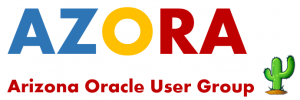
We have the slides from the two talks at our May 17th AZORA Meetup.
Here are Stephen Andert’s slides: Networking is NOT just cables and fiber!
Here are Doug Hood’s slides in three parts:
- Using SQL and PLSQL for Mid-Tier Database Caching
- Oracle TimesTen Scaleout – World’s Fastest OLTP DB
- Oracle In-Memory Data Processing
I wanted to share my impressions of the two talks and the meeting as well as share the slides. Of course, these are my opinions shaped by my own experiences and not universally true of everyone!
This meetup had two very different types of talks. I thought of Stephen’s talk as a career development or soft skills sort of talk. I have been to a number of talks like that at national Oracle user group conferences such as Collaborate. They help balance out the purely technical Oracle database content. Once Stephen got into his talk, I really started to appreciate the quality of the content. To me he was talking about keeping in touch with people in an intentional but sincere way. I like the idea of planning on contacting people a certain number of times per year for example.
Years ago, in my first job I worked for Campus Crusade for Christ (now Cru) and I raised money to support myself and my family. I networked with people that I met through churches and friends and family members. It was different than networking as part of a DBA career because I was directly asking for money instead of making career-oriented connections. But the core idea that I remember from Stephen’s talk applied then. Stephen’s idea was to genuinely seek to help the folks in your network without focusing on what they could do for you. In my CCC days the support raising training told us that we were not “fundraising” but instead “friend raising”. I had some great experiences meeting people and getting to know them and I think it was best when my focus was on how to inspire and encourage the people I met rather than to anxiously think about whether they could give money to support what I did.
The other less serious connection I saw between Stephen’s presentation and my Cru days is that Stephen has a hand-written database setup to keep track of his people. Back in the day I had a Paradox database from Borland running on MS-DOS to do a lot of the same things. So, hearing Stephen talk about his contact database was a blast from the past for me.
I am not really doing much in the way of networking myself these days. I write this blog. I speak at conferences every couple of years or so. I help with the local Oracle user group AZORA. But I am not intentionally making and maintaining relationships with other technical people in the way Stephen described so his talk gave me something to think about.
Doug Hood’s talk was at the other end of the spectrum with some cool technology. Doug spoke on several things and with a lot of detail so I cannot do a good job of summarizing what he said. Check the slides for more details. But I do want to write down my impressions. Listening to Doug’s talk reminded me of some of the computer science study that I have been doing on my own recently. I have sort of gone back to school as an independent learner. When Doug talked about the memory hierarchy and caching it tied right back to the assembly language and algorithms study I have been doing.
Doug presented some cool hardware that puts persistent memory close enough to the CPU that it changes the way we think about memory hierarchy. What if you replace your RAM with persistent RAM that did not get cleared when you power off your computer? Evidently in some architectures (maybe all the modern ones these days I don’t know) the RAM is closely connected to the CPU and does not have to be accessed over the bus in the way I/O is. So, persistent RAM would be much faster than some solid-state disk being read over the bus no matter how fast the SSD is. Anyway, see Doug’s slides. I am sure that I am butchering the details, but I am giving my impression and my memory so keep that in mind.
In general database work and database performance has a lot to do with caching. I have heard a little bit about how algorithms can be designed to work well with CPU caches. I recently read a chapter about the B-Tree data structure that is used in databases and it was a big contrast to the other data structures I had studied because it took disk reads and memory accesses into consideration. Anyway, at a high level I took away from Doug’s talk notions about memory and caching and different ways people can tweak the memory hierarchy to get better database performance.
I had to leave a little early to head for the mountains for the weekend but as always, I valued the time I spent at AZORA, my local Oracle user group. I appreciate Stephen and Doug stepping up and giving their presentations. I hope that my links and the way I characterized their talks is accurate enough. I am sure that I made mistakes, but I got something out of my time and appreciate their efforts.
AZORA is taking a break for the hot Arizona summer but coming back strong with our next meeting on September 27th. The details are being finalized so keep an eye on our Meetup page.
Bobby

